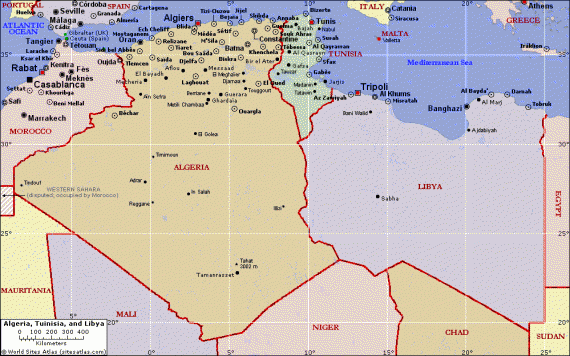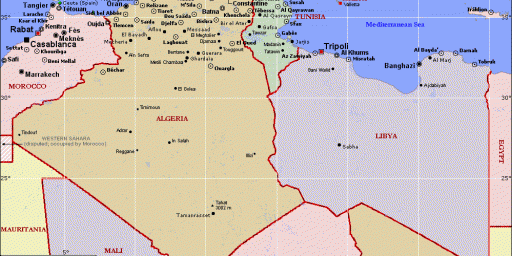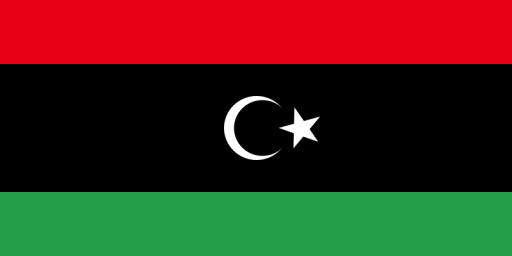The Plan In Libya? There Is No Plan
It has become quite apparent that neither the White House nor our coalition partners have any idea what the path to an endgame in Libya even looks like. That's not good.
Four days into the United Nation’s engagement/war/no-fly-zone in Libya, it’s becoming increasing apparent that nobody thought this thing through before giving the go orders on Saturday. Consider,for example, these comments by President Obama during an interview with Univision last night in El Salvador:
In an interview with Univision Tuesday, President Obama re-defined the term “exit strategy,” and said our exit strategy in Libya would begin this week.
“The exit strategy will be executed this week,” President Obama said, “in the sense that we will be pulling back from our much more active efforts to shape the environment. We will still be in a support role. We will be supplying jamming, intelligence and other assets unique to us.”
Planes in the air? Ships in the Mediterranean? Intelligence being provided? Doesn’t sound like an exit strategy at all.
What it does recall is Lewis Carroll.
“‘When I use a word,’ Humpty Dumpty said, in rather a scornful tone, ‘it means just what I choose it to mean — neither more nor less.”
That pretty much sums it up, it would seem. At this point, the Administration seems to be playing a desperate rear-guard action in which they’re emphasizing the fact that American forces are not going to be principally involved in enforcing the no-fly zone, at least for the moment. But that’s not an exit strategy. Even if our role will shift to the background we’ll still be involved and, if and when it becomes clear that the no-fly isn’t working, someone is going to have to do something about. And guess who that someone will turn out to be?
It isn’t really just Obama’s fault, though. Even the British Armed Forces Minister can’t identify what the exit strategy is:
The Government does not know how long the Armed Forces will be engaged in Libya, a defence minister admitted as debate intensified over the likely outcome, cost and leadership of the mission.
Nick Harvey, the Armed Forces minister, was asked how long Britain would be involved in the military operation in north Africa. He replied: “How long is a piece of string? We don’t know how long this is going to go on for.”
His admission, three days into the intervention, came as ministers faced mounting pressure to set out the limits of Britain’s involvement and explain their eventual exit strategy.
MPs were becoming increasingly concerned that Britain would be “sucked in” to a prolonged conflict.
Adding to the sense of uncertainty, France and Britain remained at odds over a plan for Nato to take over command of military operations when the US winds down its involvement, a transition expected in days.
The dispute over who is going to end up being in charge of the mission over Libya has gotten so contentious, that Germany, which opposed intervention, has pulled its ships out of the NATO contingent in the Mediterranean Sea. Nobody knows who’s in charge and, more importantly, nobody seems to want to be in charge, least of all the President of the United States. That’s nothing less than a recipe for disaster.
Update: If anything, I’m getting the feeling that the situation is worse after reading the comments made today by the Chief of Naval Operations:
The U.S. military does not know when it will hand off control of the intervention in Libya to an international coalition, or whether a transfer of power will allow it to reduce its role in the war, according to the Navy’s top military officer.
Adm. Gary Roughead, the Chief of Naval Operations, said that he has received no guidance on the path ahead for command and control of the no-fly zone, no-drive zone, no-sail zone, arms embargo enforcement, and any other missions currently being managed by U.S. Africom Commander Gen. Carter Ham, who is in Germany. NATO has been battling internally over whether to take command, while the French government’s latest proposal is to set up a “political steering committee” made of Western and Arab foreign ministers.
Diplomatic sources told The Cable that the United States has communicated to its European partners that it wants to hand off command of the Libya war by the end of this week. But the White House hasn’t said whether it supports the French plan. Meanwhile, the Navy, which is conducting the bulk of the operations, has no idea what the transfer of control will look like, or when it might take place.
“We are very mindful of the transition to another command and control lead or structure,” Roughead told a meeting of the Defense Writers Group, a set of reporters who interview senior officials over greasy eggs and bacon. “There are a lot of political aspects to it…. Obviously I’m interested in the transition to a different command and control structure.”
“Do you have any clarity at all on what the follow-up transition command structure is going to be?” Wired‘s Spencer Ackerman asked Roughead.
“They’re still working that,” Roughead said






I disagree, Doug. I think that the U. S., Britain, and France all have very clear ideas about the end state. Differing ideas, probably, but clear ones nonetheless. This is an Underpants Gnome-style problem. They know where they are and they know how they want things to end up. They just don’t have a clear idea about what it will take to get there.
“…nobody seems to want to be in charge…”
Actually, I think it’s fairly obvious the French want to be in charge. They’re giving off all the signals short of bouncing up and down with an arm in the air going “Me, sir! Me! Me! I’ll do it! Me!”.
The problem with that being that almost nobody outside of France wants the French in charge of stuff.
Additionally, like practically all real world problems whatever plan they had to begin with didn’t survive contact with the enemy. Just attempting to solve a problem changes the contours of the system you’re dealing with so that it’s different from the system as it was before you started. We’ve already seen some signs of that.
Also, anybody who thought that Qaddafi wouldn’t respond to this change in circumstances was living in a fools paradise. I’m pretty sure I know what I would do if I were in Qaddafi’s shoes and I note that others have already made some suggestions. Read a New Republic article on that just the other day to the effect that one, the other, or even both sides of the Libyan civil war are likely to begin an insurgency that could go on for decades and involve Egypt, Tunisia, or beyond.
There was a piece on the Spectator website a few days back arguing that we should have a pause in operations and put out some diplomatic feelers. Any pause is going to be risky, but I think we’d possibly be well served by encouraging the Turks to try some mediation, possibly including hefty incentives to get Gaddafi to sling his hook. I don’t see how we turn a long conflict into a win.
Of course, the problem with that might be that Gaddafi also doesn’t see how we turn a long conflict into a win, thus giving him some impetus to try to cling on and be as vexing as possible.
Are you just playing dumb with this in order to maintain a critical tone, or what?
This is not very complicated.
It is the policy of the US government to encourage the Libyan people to mount a democratic revolution against their dictator.
It is the policy of the US government that any such revolution need be owned and implemented by the people, and not by outside forces (like us).
It is the policy of the US government to use military force pursuant to the UN resolution to prevent the government of Libya from carrying out massacres of its own people.
It is the policy of the US government that it is not the role of the US government, or any other foreign power to dictate the political outcome in Libya.
I think all of our policy decisions and all of Obama’s statement are consistent with these principles, and the prinicples themselves are not in any way contradictory. They form an overall policy which is crystal clear, and in keeping with consensus American attitudes toward democracy and humanitarian interventions. Why is this so hard to figure out?
Yes, it means that the outcome is uncertain, as opposed to the imagined certainty that would come if the US had decided to invade and overthrow Gadaffi. But who here, or anywhere would advocate for a full fledged war in Libya? On the other hand, who really objects to our protection of the rebels?
If you take those two stands, no invasion, but massacre-prevention, then the Obama policy is pretty much what you are going to end up with. Perhaps one of his innovations here is to push our European and Arab allies to take a more central role. This I think is a very wise and welcome attitude that will have large long-term benefits to our global leadership position. If we end up down the road with more of a central role, it will be because the international community begs us to do so, rather than the usual situation where we grasp a central role for ourselves and much of the international community resents it.
I believe this is the New Republic article Dave mentions:
Libya’s Coming Insurgency
Similar assessment at Small Wars Journal:
Qaddafi’s Next Moves
This is a Libyan civil war. There will be no American troops on the ground. The Libyans do not want any Western troops in their country. Since we are avoiding the casualties of a ground war, just what “disaster” are we talking about? Bad optics? Diminished prestige? Or some other BS complaint?
On the other hand, if we’d had this sort of hand-wringing debate over Iraq, we wouldn’t have gone in the first place.
Looks like the plan is to help the rebels just enough to give them the upper hand.
Which is rather ghoulish when you think about it.
Again I’m reminded of Michael Vick and his dog fights.
“Sort of the same way went into Iraq without a post-Saddam plan. ”
What a ridiculous comparison. In Iraq we invaded the country to overthrow the dictator. Failing to address the “what next” question in a serious manner was downright criminal, given that we explicitly assumed responsibility for the country by disposing of its government and occupying the country with our troops.
In Libya, we are not mounting a military effort to overthrow the government, we are not invading the country, let alone going on to occupy it, We are installing a no-fly zone and preventing the government to massacre its citizens. Period.
That the outcome is uncertain is a function of the fact that we have not chosen to assume responsibility for dictating outcomes. As no one, here or there would want us to.
Your seeming desire to want a defined end game implies that you want the US to take responsibility for dictating the outcome – which would be highly unlikely to happen without a commitment of ground forces. Given that you wouldn’t want that, what exactly is your point here?
Tano, I agree with your assessment. The problem seems to be cooperation within the coalition and communication about what is going on. Some of that may be the fault of the White House and some the fault of various coalition members.
It may not be going as smoothly as desired but it’s not a disaster. Yet. So let’s hope for success.
“We are installing a no-fly zone and preventing the government to massacre its citizens. Period. ”
In other words, we are killing Libyans to save Libyans.
And the Libyans we are killing didn’t start the fight.
How disgusting.
“In other words, we are killing Libyans to save Libyans.”
Yeah, imagine that. Killing regime soldiers intent on massacring innocent civilians. What a concept.
Tano:
Very coherently put.
The Right is behaving very badly on this, simultaneously ranting that we should have gotten in earlier and yet be better-prepared.
I’ll remind everyone again: elapsed time from first Libyan demonstrations to us and our allies blowing stuff up: 30 days.
What is accomplished in 30 (less of course in reality) days is probably not going to be entirely smooth. But for Republicans to attack a lack of seamless preparation while simultaneously whining that there should have been even less preparation isn’t just stupid, it’s deliberately dishonest and in the circumstances, shameful.
What I want to know is who allowed the outrage of greasy eggs and bacon come about? Okay, the CNO knows that if he wants to get good food, he’ll have to go to the Chief’s Mess, but these are reporters here! On top of that, what if some of them are Jewish, or even Muslim?
This is an outrage, I tell you!
“Killing regime soldiers intent on massacring innocent civilians. ”
That was the plan in Iraq and Afghanistan, too.
Our 80 I.Q. heroes seem intent on killing civilians, too, though.
It’s like they can;’t help it.
Ponce:
I don’t understand that comment.
Dave – Let’s hope that at the least those underpants we’re gathering are clean.
Ponce – Remember, we have to destroy the village in order to save it (just as the Masters of the Universe had to destroy our economy in order to save it).
“I don’t understand that comment.”
In Afghanistan, credit for civilian deaths split evenly between the Taliban and U.S. forces.
In Iraq, god knows how many civilians we slaughtered…
Affirmative action students/professors don’t need to have planning skills, do they?
I think that’s offensive and wrong. In fact the reason our weapons are so expensive is in part because of our determination to minimize civilian casualties. If we could simply strike wherever we liked without concern for civilians we’d have wrapped this up on Day 2.
As for “80 IQ, heroes,” i’m honestly shocked that someone with your intelligence and judgment — and you and I are most often in agreement — would make that particular crack about what is, without question, the most professional, best-trained, and most humanitarian military force in human history.
“I think that’s offensive and wrong.”
Maybe it’s a little out of line, but if you review, say, the WikiLeaks tape of the Apache pilot begging for permission to shoot a van full of kids, I think we can agree the U.S. military isn’t exactly chock full of Audie Murphys these days.
http://www.youtube.com/watch?v=5rXPrfnU3G0
Just today a local kid pleading guilty to murdering three Afghan civilians.
He pled guilty because he had been arrested and charged with a crime. Which by definition means that this behavior is outside the norm and does not represent what our soldiers are about.
Yes, there have been atrocities, and there will be mistakes. When you put young people in harm’s way they do make mistakes, and some are criminals. But you can’t generalize to the US military from that, any more than you can generalize about a race, an age, a nationality or religion based on a limited number of cases.
The funny thing is that even our most bitter foes don’t have much of a case against us on this.
60 odd years ago we firebombed cities full of people and killed them in the tens of thousands. Now we occasionally miss a target and accidentally hit civilians. Of course that’s tragic. But to fail to see that we’ve made progress by virtue of enormous expenditures and effort is unfair. And when we do the math on this, let’s think long and hard about what Gaddafi would have done with the million or so innocent people in Benghazi. Because as gruesome as it is, it does come down to a matter of math.
Had we been able to knock Auschwitz out of operation with a bombing raid that killed 10 German civilians, would you have taken the shot?
Plans may not survive contact with the enemy, but please do not conflate plans with objectives.
“But you can’t generalize to the US military from that”
No.
Nor can you pretend that Libya won’t turn out just like Iraq and Afghanistan, a brutal, sloppy and expensive operation that will most likely end up slaughtering far more civilians than it saves.
As a former “deliberate” planner, oh, there is a plan, or rather there WAS a plan…
Okay we’ve done the “deployment” and the “employment” but there’s no “re-deployment and recovery of forces.”
It must have gone to the shredder.
In a real spooky way this all reminds me of the Balkans in the 1990s, and many of us KNOW how well that turned out.
“In a real spooky way this all reminds me of the Balkans in the 1990s, and many of us KNOW how well that turned out.”
Yea, we sure do. Relative peace and quiet since 1995 without US casualties.
Oh, I get it. We weren’t killing Moslems …